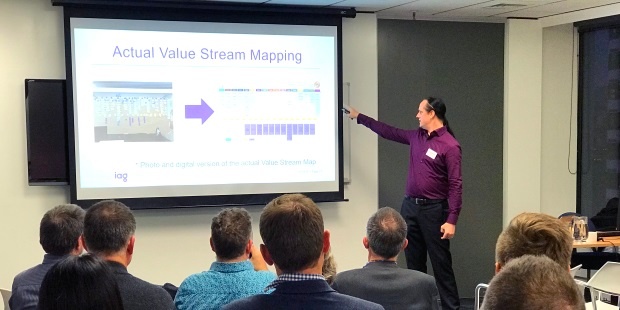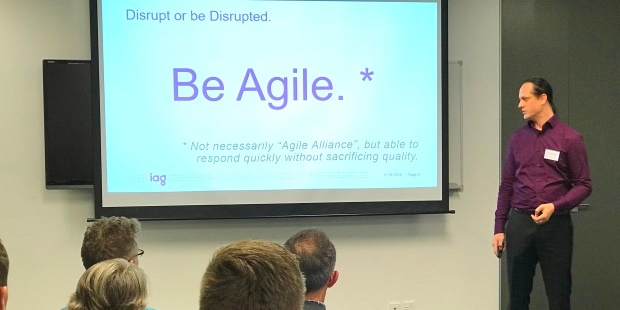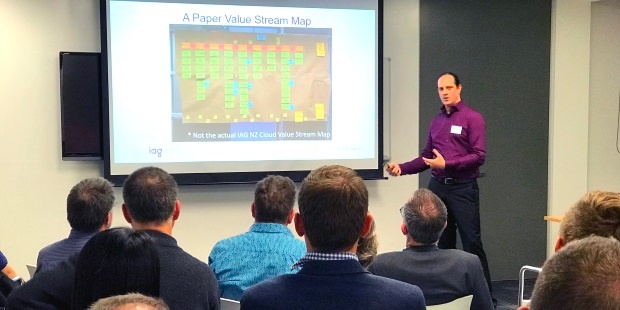Share this
IAG New Zealand's Daniel Scott-Raynsford presents on their journey to the cloud
by Brendon Livingstone on 07 June 2018

Shane Ross introduced Daniel Scott-Raynsford of IAG New Zealand at our client event a couple of weeks ago, and in the process he provided some context on why we approached IAG to speak. Many examples of successful DevOps, Agile and Cloud adoption focus on start-up and high-growth companies who are able to bake in these approaches from the start, unencumbered by legacy technology, strict regulatory controls and deep-rooted structures and ways of working.
IAG New Zealand, as the country's largest insurance provider, has been through a 12 month journey to implement services in the Cloud and adopt DevOps and Agile approaches. In an industry that is facing disruption they made the decision to disrupt themselves first.
As a large, complex and established company, they have begun a journey to transform to different models and modern ways of working. Daniel is IAG New Zealand's Continuous Delivery Practice Lead. It was a pleasure to host him and have him speak to our clients about IAG's journey and the lessons they learned through the process.
This post summarises some of Daniel's points...
Why transform?
IAG New Zealand has 47% of the New Zealand insurance market and runs some of our country's leading insurance brands such as AMI, State and NZI. The company has 4,000 employees in New Zealand.
The insurance industry faces disruption, not only from competitive activity, but also from the impact that society changes have on insurance. For example, what are the implications around insuring self-driving cars or car sharing models?
IAG New Zealand has grown through acquisition and as such has a lot of different core and legacy systems, many of which are tightly coupled. This complexity introduces cost and risk, but also makes it more difficult for IAG to respond to disruption.
IAG decided that to respond to disruption they needed to 'Be Agile'.

Transforming people, process and platform
While the transformation centered around IAG's journey to the cloud, the scope of change focused on a wider set of principles, including:
- People - empowered, cross-functional teams delivering customer value
- Process - continuous delivery with intent of committing to production in less than one hour; auditable and secure deployment with no production write access
- Platform - loosely coupled, cloud native applications running on platform as a service (PaaS).
Daniel spoke about their adoption of 'the other Moore's law' - "build what differentiates you, buy what doesn't". He also showed how they used value stream mapping to get value to the customer through their process, with a focus on identifying bottlenecks and risks and minimising waste and handoffs.

Starting with an experiment and ramping up
IAG New Zealand began their journey with an experiment by selecting a small, internally facing project and developing a cloud native application. They kept the delivery pipeline simple, with limited automation and not too many controls. They learned a huge amount that they rolled into their following activities.
Over time IAG New Zealand ramped up from one initial cloud development team to the current seven plus cloud development teams. Their processes matured from simple release pipelines to more complex with increasing focus on controls, security threats, performance testing, production monitoring and architecture adjustments.
The transformation is not complete yet, with more teams expected to transition into cloud development and DevOps and Agile approaches. Daniel's team is looking at the lessons learned and re-embedding the ways of working to continuously improve.
What IAG learned
- Deploy without release - we're conditioned to make something perfect before we deploy and as such it is hard to convince teams to deploy a Minimum Viable Product (MVP) that is 'good enough'. But, deploying to production doesn't mean you are releasing to the customer, and by not deploying to production you lose the opportunity to learn and increase the risk of things going wrong when you do finally deploy with intent of releasing to the customer.
- Include security early - security is very important for financial institutions. With the new cloud platforms and architectures it was important to have security specialists involved early and this is an area where Daniel thought they learned important lessons about how and when to get security involved.
- Continuously re-embed the changes - in a major transformation there is a lot going on, things are evolving, and new people are regularly being introduced as the activity ramps up. As the pressure comes on it is easy for people to slip back to their old ways of working. The changes and evolution of those changes need to continuously be embedded and re-embedded.
- Manage bottlenecks - value stream mapping was useful for identifying bottlenecks, but Daniel indicated that next time he would pay more attention to keeping the value stream map up-to-date. As the process ramped up with more and more development teams, other specialist roles, such as security, became overwhelmed with demand.
- Give teams time to learn - when IAG started the journey they didn't have 50 cloud experts ready to go. It takes time for development, operations, security and other teams to learn about the many changes with Cloud technologies and Agile and DevOps approaches. You need to give teams time to learn.
Daniel indicated there were many more lessons learned, but in the interests of time had just included some key ones.
It was fascinating to hear Daniel speak about their journey, how they approached the transformation and the lessons they learned along the way. The presentation was well received by those attending with a good number of questions and follow-on discussion about:
- Empowering teams while also managing cloud consumption costs
- How to deal with legacy systems when moving to the cloud, including ideas around the 'strangler strategy'
- IAG's chosen cloud platforms, toolsets, and 'modern' Agile approaches
- Working through the human and structural challenges of changing an organisation.
We're very grateful to IAG New Zealand and to Daniel Scott-Raynsford for sharing this journey and lessons learned with Equinox IT and our clients. Thank you.
Share this
- Agile Development (153)
- Software Development (126)
- Agile (76)
- Scrum (66)
- Application Lifecycle Management (50)
- Capability Development (47)
- Business Analysis (46)
- DevOps (43)
- IT Professional (42)
- Equinox IT News (41)
- Agile Transformation (38)
- IT Consulting (38)
- Knowledge Sharing (36)
- Lean Software Development (35)
- Requirements (35)
- Strategic Planning (35)
- Solution Architecture (34)
- Digital Disruption (32)
- IT Project (31)
- International Leaders (31)
- Digital Transformation (26)
- Project Management (26)
- Cloud (25)
- Azure DevOps (23)
- Coaching (23)
- IT Governance (23)
- System Performance (23)
- Change Management (20)
- Innovation (20)
- MIT Sloan CISR (15)
- Client Briefing Events (13)
- Architecture (12)
- Working from Home (12)
- IT Services (10)
- Data Visualisation (9)
- Kanban (9)
- People (9)
- Business Architecture (8)
- Communities of Practice (8)
- Continuous Integration (7)
- Business Case (4)
- Enterprise Analysis (4)
- Angular UIs (3)
- Business Rules (3)
- Java Development (3)
- Lean Startup (3)
- Satir Change Model (3)
- API (2)
- Automation (2)
- GitHub (2)
- Scaling (2)
- Toggles (2)
- .Net Core (1)
- Diversity (1)
- Security (1)
- Testing (1)
- February 2024 (3)
- January 2024 (1)
- September 2023 (2)
- July 2023 (3)
- August 2022 (4)
- August 2021 (1)
- July 2021 (1)
- June 2021 (1)
- May 2021 (1)
- March 2021 (1)
- February 2021 (2)
- November 2020 (2)
- September 2020 (1)
- July 2020 (1)
- June 2020 (3)
- May 2020 (3)
- April 2020 (2)
- March 2020 (8)
- February 2020 (1)
- November 2019 (1)
- August 2019 (1)
- July 2019 (2)
- June 2019 (2)
- April 2019 (3)
- March 2019 (2)
- February 2019 (1)
- December 2018 (3)
- November 2018 (3)
- October 2018 (3)
- September 2018 (1)
- August 2018 (4)
- July 2018 (5)
- June 2018 (1)
- May 2018 (1)
- April 2018 (5)
- March 2018 (3)
- February 2018 (2)
- January 2018 (2)
- December 2017 (2)
- November 2017 (3)
- October 2017 (4)
- September 2017 (5)
- August 2017 (3)
- July 2017 (3)
- June 2017 (1)
- May 2017 (1)
- March 2017 (1)
- February 2017 (3)
- January 2017 (1)
- November 2016 (1)
- October 2016 (6)
- September 2016 (1)
- August 2016 (5)
- July 2016 (3)
- June 2016 (4)
- May 2016 (7)
- April 2016 (13)
- March 2016 (8)
- February 2016 (8)
- January 2016 (7)
- December 2015 (9)
- November 2015 (12)
- October 2015 (4)
- September 2015 (2)
- August 2015 (3)
- July 2015 (8)
- June 2015 (7)
- April 2015 (2)
- March 2015 (3)
- February 2015 (2)
- December 2014 (4)
- September 2014 (2)
- July 2014 (1)
- June 2014 (2)
- May 2014 (9)
- April 2014 (1)
- March 2014 (2)
- February 2014 (2)
- December 2013 (1)
- November 2013 (2)
- October 2013 (3)
- September 2013 (2)
- August 2013 (6)
- July 2013 (2)
- June 2013 (1)
- May 2013 (4)
- April 2013 (5)
- March 2013 (2)
- February 2013 (2)
- January 2013 (2)
- December 2012 (1)
- November 2012 (1)
- October 2012 (2)
- September 2012 (3)
- August 2012 (3)
- July 2012 (3)
- June 2012 (1)
- May 2012 (1)
- April 2012 (1)
- February 2012 (1)
- December 2011 (4)
- November 2011 (2)
- October 2011 (2)
- September 2011 (4)
- August 2011 (2)
- July 2011 (3)
- June 2011 (4)
- May 2011 (2)
- April 2011 (2)
- March 2011 (3)
- February 2011 (1)
- January 2011 (4)
- December 2010 (2)
- November 2010 (3)
- October 2010 (1)
- September 2010 (1)
- May 2010 (1)
- February 2010 (1)
- July 2009 (1)
- April 2009 (1)
- October 2008 (1)